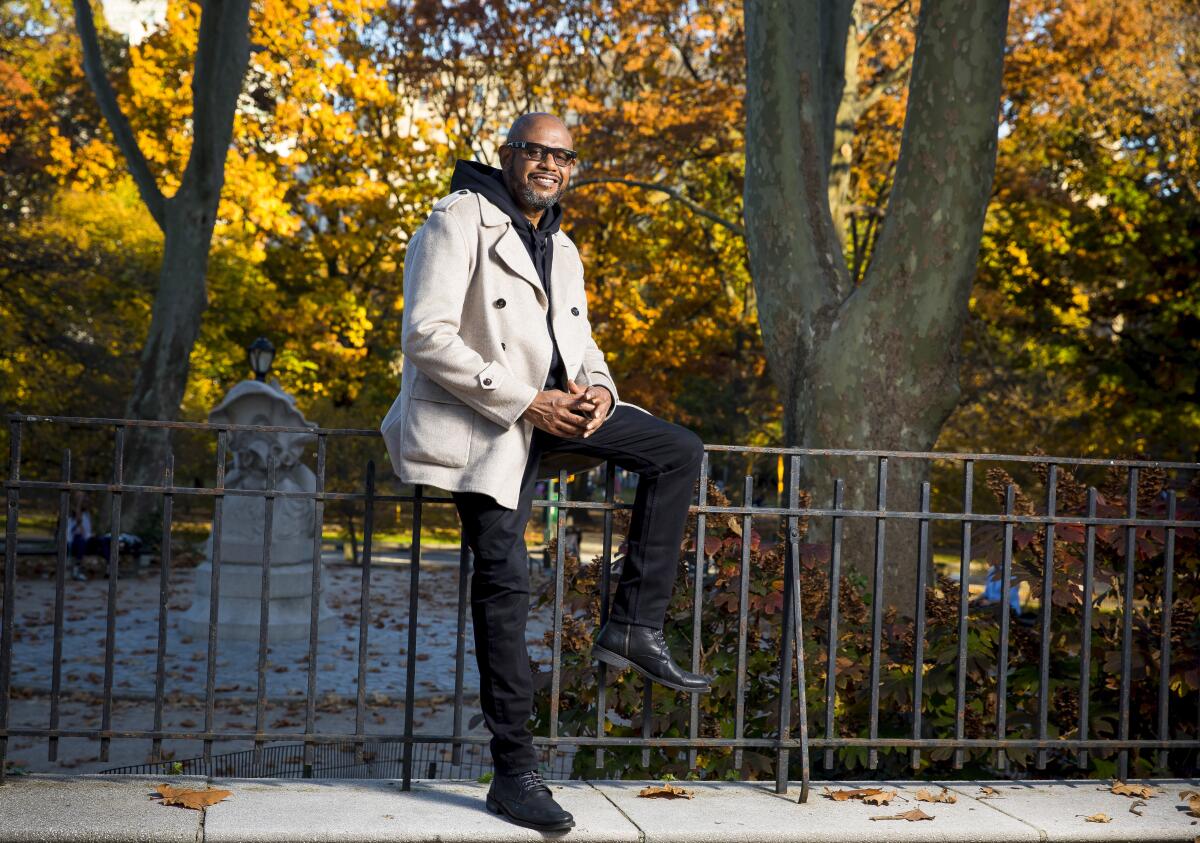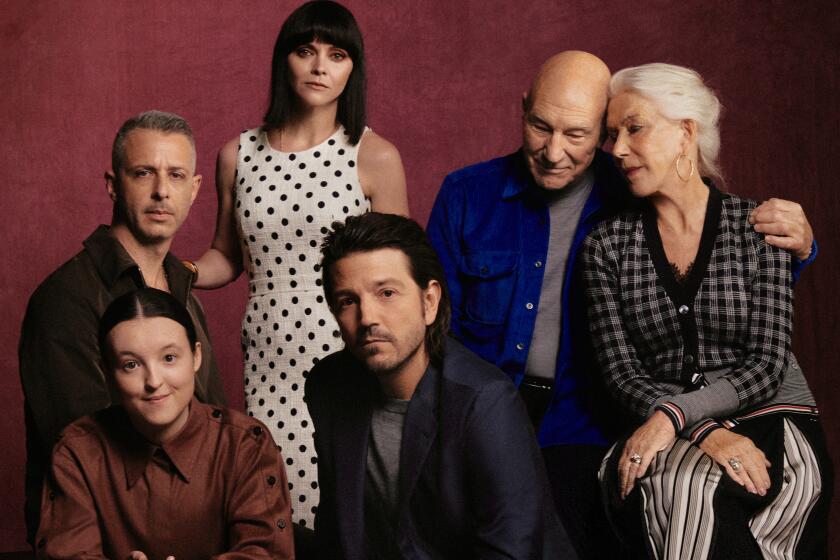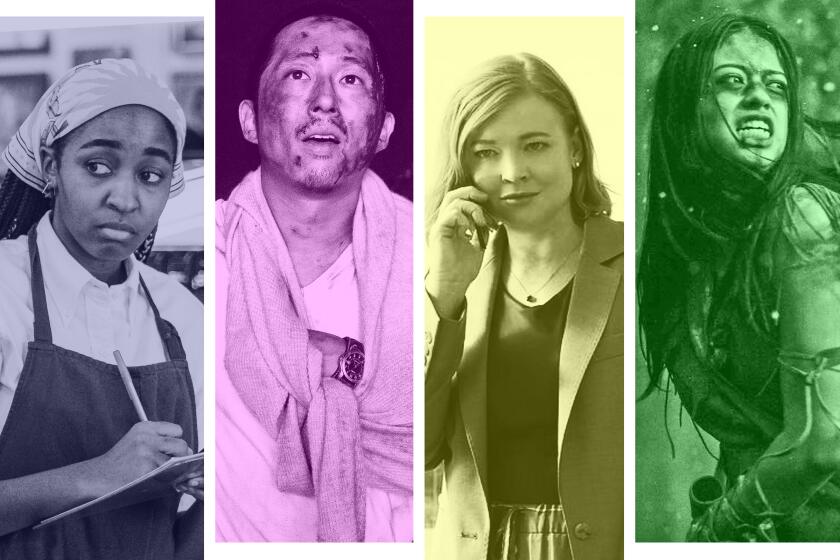How Forest Whitaker plays a poet, philanthropist, murderer and drug kingpin all at once

- Share via
A Black teenager gets shot dead by a policeman, opioids wreak havoc and the U.S. government flounders in the face of a divided nation. The year is 1964. The show is “Godfather of Harlem.” And the title character mired in this depressingly familiar scenario, portrayed by Forest Whitaker, pushes a man off the roof of a building at the end of the season, sees him splatter on the sidewalk, then goes home in his tailored suit to an immaculately furnished townhouse in time for dinner with his wife.
It’s just another day at the office for Ellsworth “Bumpy” Johnson, the real-life complicated criminal who once ruled Harlem’s heroin trade. Whitaker, speaking from his New York City home, says, “Here’s a guy who was a chess player, a poet, a philanthropist, a murderer and a drug dealer. We knew from the start he was complex, especially because we chose a time in Bumpy’s life that reflects his day and our day as well.”
The MGM+ series represents a deep, dark dive for Whitaker, who’s been imagining himself as the real-life narcotics kingpin since 2018, when producers Markuann Smith and Jim Acheson first pitched him on bringing Bumpy Johnson to the small screen. “I told them I’d be interested in producing and possibly acting in the show depending on if it could serve as a prism to society today and reflect where we are right now through the characters and their world,” Whitaker says. “The draft script from Chris Brancato and Paul Eckstein did that, so I decided to act in the project.”
Season 3 begins in the wake of Harlem riots following the death of 15-year-old James Powell at the hands of an off-duty police officer. “Bumpy saw all his dreams go up in smoke in the riots, and now he’s left with nothing,” Whitaker says. “He gets thrown into a different world with the Cuban Mafia, the CIA, the FBI and the five [Mafia] families. It’s a lot to navigate as an actor, because Bumpy has to change within this environment in order to succeed.”
In a roundtable conversation, Diego Luna, Helen Mirren, Bella Ramsey, Christina Ricci, Patrick Stewart and Jeremy Strong dive deep into their appreciation of writers, mothers and “not giving a f--”
As an actor, Whitaker has successfully changed his own persona many times dating to his 1986 scene-stealing turn opposite Paul Newman in “The Color of Money.” Additional to dozens of fictional characters, he portrayed a couple of real-life figures to thrilling effect. As jazz great Charlie Parker in Clint Eastwood’s 1988 biopic “Bird,” Whitaker learned to play saxophone and sometimes, he says, considered each note to be a different word as part of his character’s personal expression. In 2007 he won an Oscar for playing Ugandan dictator Idi Amin in “The Last King of Scotland.” For that role, Whitaker studied Barbet Schroeder’s documentary about Amin and learned Swahili.
“When you create a real character, you have an arrow that points you to things you have to re-create,” he says. “It’s a different process for each character, but in some ways, it’s the same. Slowly, slowly, a voice starts to happen. The way you stand, the way you growl, the way internal tension makes your voice more tense — it all starts to take hold of you and the character starts to form. But it was different for Bumpy.”
Johnson had been mythologized in numerous movies, including “Hoodlum,” starring Laurence Fishburne, and “American Gangster,” featuring Denzel Washington as the gangster’s successor. But when it came to original source material, Forest encountered a dearth of visual references. “Bumpy didn’t like his photograph being taken,” Whitaker explains. “He’d been a criminal from the 1930s through the late ‘60s, and there’s only, like, four photographs of him.”
To glean insights about the publicity-shy gangster, Whitaker spent time with Johnson’s elderly driver and an enforcer named Junie Byrd. “The stories these guys told me, Bumpy was not afraid to get his hands dirty. If somebody needed to be killed, he was willing to take that on.”
Our BuzzMeter panel of veteran TV journalists predicts the winners in 14 categories of the 2023(?) Emmys. You can, too, in our weekly polls.
Whitaker also credits the show’s wardrobe department with tailoring a sartorial identity befitting the gangster’s self-concept. “We paid a lot of attention to the suits,” Whitaker says. “At the start of the show, designer Domenico Vacca created these elegant but conservative suits for Bumpy. He doesn’t flaunt anything. Bumpy’s a businessman, almost like a banker, and it’s rare that you see him out of a suit.”
Johnson must contend with ugly competition from the Mafia, including crime boss Vincent D’Onofrio’s “Chin” Gigante and Joe Colombo (Michael Raymond-James). Even as he’s fending off the mob, Johnson’s wife, Mayme (Ilfenesh Hadera ), pressures him to quit the business altogether. That’s not going to happen, Whitaker says. “Joe Colombo makes him a good offer [to get out], but Bumpy refuses the deal. He says, ‘When I leave these blocks, I’m treated like every other Black person, subjugated and humiliated. Here in Harlem, I have power.’ Bumpy can’t give that up.”
Unlike his Bumpy Johnson, who spits out his lines with dagger-like velocity, Whitaker speaks softly, pausing periodically to gather his thoughts. “By Season 3,” he murmurs, “Bumpy’s feeling tremendous frustration. It’s like he’s banging his head against the wall wanting to scream, feeling at times like a caged animal.” Johnson’s legendary temper fueled considerable violence, especially when a CIA operative forcibly injected his daughter Elise (Antoinette Crowe-Legacy) with heroin.
“That’s truly war,” Whitaker notes. “I have four kids, and their protection has always been a big goal in my life. If somebody were to do something like that to my daughter — incomprehensible. And I know people whose kids have been harmed by drugs. You feel weak, helpless. Bumpy’s outraged, but he’s also afraid of not being able to protect his daughters. I understand that from the bottom up.”
While rage drives much of Johnson’s behavior, Whitaker also reveals the gangster at his most vulnerable. During the season finale, Bumpy Johnson tearfully reckons with the assassination of his old friend and mentor Malcolm X. On the set that day, Whitaker recalls, “I found a quiet space. Dug up some emotional memories and thoughts. The scene was shot in a real morgue, so when I walked into the room, there he is on the table, a dead prince. It was quite a difficult scene to do, taking in this man who, for Bumpy, represented the freedom to stand tall and fight for what you believe in. There he is lying on a cold slab.”
For a moment, it looks as if Johnson might have an epiphany and find some form of redemption. After all, Whitaker observes, “Malcolm X had hoped to convert Bumpy to being a good citizen inside of the community. He wanted Bumpy to leave behind his darker ways. But ultimately, [he goes] back to his reserve, being a criminal and saying: ‘I’m going to avenge this. I’m going to take action.’”
More to Read
From the Oscars to the Emmys.
Get the Envelope newsletter for exclusive awards season coverage, behind-the-scenes stories from the Envelope podcast and columnist Glenn Whipp’s must-read analysis.
You may occasionally receive promotional content from the Los Angeles Times.












